The Rise of Plexiglass
My dear Dr. F,
What a splendid coup you’ve orchestrated with the Plexiglass Panic! I must confess, even I did not anticipate how eagerly these humans would embrace such a transparent symbol of their own fear. A wafer-thin sheet of plastic, and yet it has sparked untold billions in spending and an equally colossal surge in self-congratulation.
Observe their determination to appear responsible: from the smallest corner shop to the loftiest government office, all have hastily installed clear dividers as if they were fortresses against the world’s ills. Never mind that the virus dances around these barriers like an invisible wraith at a masquerade ball; the humans stand in awe of their own display of action. A perfect demonstration of “optics over outcomes.”
Your brilliance lies in the simplicity. Plexiglass offered them something tangible in a storm of uncertainty. They needed a shield, so you gave them plastic. And they said, “At last, we are safe!” Oh, the irony! A carnival game at best, but they’re too panicked to notice the futility. Now they scuttle behind these clear walls, convinced that if they can only see each other through plastic, no harm can befall them.
Keep fanning the flames, dear nephew. The more they celebrate their plexiglass partitions, the less inclined they’ll be to acknowledge the science that sneers at their wasted efforts. Fear is your ally; ignorance, your herald.
Your affectionate uncle,
Screwtape
Dearest Uncle Screwtape,
How right you are! The beauty of plexiglass lies not in its efficacy but its visibility. A perfect theatrical prop, it allows them to perform safety rather than achieve it. They’ve installed barriers in grocery stores, schools, even their own homes. And dare I say, the more barriers they erect, the more comfort they derive—like children building pillow forts to ward off imagined monsters.
Some have gone to absurd lengths: steel-riveted frames, towering panels that enclose checkout counters like bank vaults. The result? A labyrinth of muffled voices and fogged-up plastic. Yet they persist, proclaiming, “Look, we are doing something!” as though a virus would be stymied by a sheet of plastic taped to a counter.
Still, Uncle, a few restless minds begin to question the purpose of these barriers. Whispers of, “Do these really help?” threaten to surface. How shall I quash such inconvenient queries? Perhaps a fresh wave of headlines about novel variants, or a smattering of cautionary tales from “expert” circles? If I stir the pot just enough, the faithful will cling to their plexiglass a little tighter, for fear of being left unprotected—or worse, looking irresponsible.
Awaiting your sage counsel,
Dr. F
The Ineffectiveness of Plexiglass
My dear Dr. F,
Your concern over the inquisitive minority is understandable, but fear not. The brilliance of the Plexiglass Panic is that it was never about scientific merit. It was about optics and the desperate scramble to do something—anything!—to feel safe. Humans adore the visible gesture more than the logical one.
Of course, the barriers often make conditions worse, stifling airflow and creating new surfaces where the virus may linger. Yet those are details for the fine print—much too small to catch the public’s eye. Indeed, the very inconvenience becomes part of the ritual. Every time a cashier fumbles behind a plexiglass wall, it reinforces the narrative that it must be important if it’s this much trouble.
So let the science whisper its doubts. The humans, lost in their own anxieties, will seldom heed logic if they can cling to a glimmer of comfort. By the time they suspect they’ve been duped, they’ll have moved on to the next shiny distraction. Your only task is to ensure that this moment of revelation is perpetually postponed.
Delicious, isn’t it? They march behind shields that protect nothing but their own illusions. Press on, dear nephew, and keep them entangled in their own show of safety.
Your affectionate uncle,
Screwtape
Dearest Uncle Screwtape,
How I savor this dance between perception and reality! You are correct: the humans cling to their plexiglass partitions like toddlers clutching security blankets. All the while, stale air pools around them, invisible particles swirl overhead, and the world remains as uncertain as ever.
I take particular joy in the endless cleaning rituals. These “surfaces” must be sanitized, you see, so they wipe them down until their arms ache—satisfaction for the industrious, though it accomplishes little else. They rarely consider that viruses travel by air; they fixate on the tangible, the smear of a fingerprint as though it were the final frontier of disease prevention.
Some rational souls do raise eyebrows. They mention studies about aerosol transmission, ventilation, and the folly of static barriers. But we’ve deftly drowned them out with the clarion call of “Abundance of caution!” The phrase works like a charm. The fainthearted dare not oppose something labeled as “caution,” even if it’s misguided.
But as you note, inertia is my greatest ally. Once installed, these barriers remain. No one likes to admit a mistake—let alone a billion-dollar one. They’d sooner let dust and irrelevance pile high than tear down the walls they so proudly erected.
Ever your devoted pupil,
Dr. F
Amplifying the Fear of Human Interaction
My dear Dr. F,
Observe how our transparent shields do more than block a virus—they block the very essence of human connection! A brilliant bonus indeed. Where once customers and clerks might exchange a friendly smile, now they squint through foggy plastic, raising their voices to be heard. Instead of bridging the gap, the barriers have amplified every gulf of misunderstanding.
Masks already muffle voices, but add plexiglass and you have a symphony of muffled frustration. In that confusion, humans begin to see each other as hazards rather than companions. What a victory for us! They flinch if someone leans around the panel for clarity; they recoil at a raised voice. Let them mistake distance for safety and suspicion for prudence.
Your goal, dear nephew, is to nudge them to perpetuate this mindset. Encourage a quiet dread of proximity, a sense that closeness is careless. The plexiglass may have begun as a public-health measure, but let it continue as a wedge between their hearts.
Your affectionate uncle,
Screwtape
From Dr. F
Dearest Uncle Screwtape,
How thrilling it is to witness the erosion of simple warmth between human beings! I delight in the retail world’s new chorus of, “Could you repeat that?” as muffled voices bounce off the plastic. Even in offices, where collaboration once thrived, employees now endure stilted dialogue around barriers. Their tolerance for each other wears thin, all in the name of “caution.”
I’ve taken great pleasure in schools as well. Children, those bastions of unfiltered laughter and play, must now peer at friends through plexiglass dividers. Their every whispered secret and giggle is reduced to a half-heard echo. It teaches them from an early age that closeness is a transgression.
Some do yearn for normalcy—an end to these barriers and an embrace of the old familiarity. I fear that nostalgia might rally them to tear down the walls. How do I solidify their belief that face-to-face connection is reckless? Should I stoke whispers of new variants, or let their lingering discomfort do the work for me?
Yours in social separation,
Dr. F
The Cognitive Dissonance
My dear Dr. F,
Ah, the sweet, sweet spectacle of contradiction! How they championed environmental purity, only to bury the planet in heaps of discarded plexiglass, masks, and gloves! And did they notice? Not in the slightest, for the need to “do something” outweighed their planet-saving zeal.
This hypocrisy is as delicious as it is instructive. They soared to moral heights in one breath—“Save the Earth!”—then in the next, demanded mountains of petroleum-based plastic. Now, landfills overflow with barriers that outlast their intended use by centuries. The best part? No one wants to talk about it, because that would mean confronting their own complicity.
Keep them locked in this internal conflict, Dr. F. They will, in time, double down on their denials rather than face the shame of their mistakes. A perfect demonstration of how easily fear trumps principle.
Your affectionate uncle,
Screwtape
Dearest Uncle Screwtape,
How I revel in the self-delusion that has them touting green values one moment and installing toxic plastic by the ton the next! The cognitive dissonance is magnificent. They breathe sighs of relief behind their barriers, oblivious to the environmental toll. Indeed, they rationalize: “We must protect human life at any cost,” as though one moral imperative instantly absolves them of all other responsibilities.
Watching the landfills fill with shards of plexiglass is a particular joy. The same activists who once protested the use of single-use plastics now look upon these barriers as heroic. Confronting the environmental consequence would mean admitting they were duped—or worse, that they participated willingly. Far easier to look away.
Still, a few voices begin to question this avalanche of waste. What shall I do with them? Perhaps sow seeds of guilt: “Don’t you care about people’s lives?” That approach usually silences their environmental concerns. After all, no one wants to be labeled selfish or heartless. Fear and shame, dear Uncle, are my most reliable enforcers.
Yours in moral contradiction,
Dr. F
Economic Costs and Fallout
My dear Dr. F,
The finances! A glorious side-benefit of this entire enterprise. From humble corner shops to massive chains, all spent small fortunes erecting these plastic fortresses. In no time, the plastics industry and the installation companies raked in unimaginable profits. What a sight: a sudden bonanza conjured out of fear.
And when the authorities quietly changed their stance—when it turned out that plexiglass provided minimal benefit—did businesses demand refunds or retribution? Of course not. They merely shrugged and let the barriers stand, mortified by the possibility of admitting their error. A perfect example of human pride tangling them in their own wasted investments.
Now, many of the plastics manufacturers have pivoted to other opportunities, leaving behind a trail of worthless partitions. Businesses remain stuck with their hulking displays of caution, too embarrassed to tear them down. The money’s already spent, dear nephew, and regret is a currency humans cannot spend.
Your affectionate uncle,
Screwtape
Dearest Uncle Screwtape,
Ah, the economic whiplash is truly something to behold. Overnight, the plexiglass producers leapt from near-anonymity to become veritable titans, cashing in on this mania. The phone lines of installation companies rang day and night; entrepreneurs who barely knew how to cut plastic suddenly found themselves flush with business. And all because these humans believed that a transparent wall would save them from an airborne threat.
Now that the CDC has quietly abandoned the plexiglass recommendation, the once-thriving market has evaporated. Companies that soared to riches now scramble to survive, pivoting to new products or simply shuttering. Meanwhile, the businesses who purchased their wares are left with unsightly relics—too large to ignore, too embarrassing to remove. They hide behind them still, as though continuing the charade of “necessary measures.”
I must say, I am impressed with the inertia of it all. No one wants to confront the billions wasted on worthless barriers, for fear of looking foolish. They’d rather maintain the façade of prudence than risk ridicule. It’s a testament to pride, Uncle, and I intend to exploit it further.
Yours in profitable chaos,
Dr. F
The Quiet Reversal
My dear Dr. F,
And so, the grand pivot: The CDC quietly dropped its recommendation for plexiglass as swiftly as it had adopted it, with nary a fanfare nor apology. A silent retreat, it seems, suits them well; why draw attention to a blunder when one can pretend it never happened?
The businesses and institutions, too, have little to say. Some remove the barriers under cover of night, others keep them in place for fear of backlash. After all, taking them down might invite murmurs of, “So, you admit this was pointless?” Humans flee from accountability like frightened deer, bounding away at the first crack of self-awareness.
Your role is clear, dear nephew: cultivate their embarrassment. Encourage them to let the plexiglass remain, collecting dust and scorn. The longer they linger, the more awkward its presence becomes, yet the less they’re willing to face the truth. Let the silent shame fester.
Your affectionate uncle,
Screwtape
Dearest Uncle Screwtape,
The hush surrounding the CDC’s reversal has been a masterclass in subtlety. A document tweaked here, a footnote removed there, and suddenly plexiglass is no longer the golden child of preventive measures. Yet, no public proclamation, no grand apology—simply a quiet shift that leaves the faithful in a state of confusion.
Businesses reel from the uncertainty. Some keep the plexiglass up, muttering, “Better safe than sorry.” Others take it down, hoping no one notices the missing barriers. Both choices feel fraught with peril. Admitting error invites ridicule; clinging to plastic invites pointed questions.
I’ve done my best to sow doubt and inertia in equal measure. Reminding them how much money was spent helps. “After all,” I whisper, “would you squander your investment so soon?” The result: ghostly partitions remain in many places, a silent testament to fear and the reluctance to say, “We were mistaken.”
I relish this indecision, Uncle. It is, at once, comedic and tragic—an elaborate farce that leaves them paralyzed. I plan to let it play out a while longer before introducing new distractions, new crises.
Yours in quiet triumph,
Dr. F
My dear Dr. F,
Our plexiglass escapade highlights far more than public-health theater; it illuminates the core frailties of the human mind. These shimmering walls have become living metaphors for a species that prizes symbols over solutions, fear over fact, and optics over introspection.
Observe how quickly they turned from reason to ritual. The presence of a barrier, no matter how laughably ineffective, quelled their anxieties—at least momentarily. They chased the emotional salve over the logical cure. In doing so, they revealed their yearning for tangible tokens of safety, even when the true danger is airborne and invisible.
And see how fiercely they cling to illusions! Rather than question a costly misstep, they choose to preserve it—preferring the comfort of denial to the challenge of remorse. This behavior, dear nephew, is universal. The plexiglass debacle is but a microcosm; humans will repeat the cycle whenever fear and pride converge.
Your affectionate uncle,
Screwtape
Dearest Uncle Screwtape,
You’ve captured the essence of this little drama with your usual flair. Plexiglass was never just about a virus; it revealed their innermost habits. They latched onto the easiest “solution,” one they could see, even if they couldn’t verify its benefit.
Their reliance on optics over outcomes is a splendid trait for us to exploit. Time and again, they will scramble for visible reassurance, ignoring genuine efficacy in the process. Likewise, their aversion to reflection leaves them prone to repeating the same errors under new guises.
I will ensure these themes remain hidden in plain sight. Let them believe that plexiglass was a noble effort, that the embarrassment of waste is better left unspoken. The next time fear arises—and it will—they will cling anew to the nearest prop. After all, illusions are more comforting than facing one’s own vulnerability.
Yours in ephemeral safety,
Dr. F
A Perfect Litmus Test for Manipulation
My dear Dr. F,
Rejoice! The plexiglass caper has proven once and for all how amenable humans are to superficial fixes. Their capacity to shelve logic in favor of shiny, see-through illusions stands as a testament to their malleability. Indeed, the entire affair is a perfect litmus test for future manipulations:
Fear Eclipses Reason: In a crisis, humans will accept nearly any measure that promises safety, even if it’s no more protective than a paper shield in a monsoon.
Optics Outweigh Facts: They far prefer a visible solution—however hollow—to the invisible, complicated work of true prevention.
Denial Over Admission: Once they’ve invested time and money, they cling to that investment like it’s the last raft in a storm, even if it’s riddled with holes.
Environmental & Social Ironies: Hypocrisy runs rampant, from eco-minded folks celebrating plastics to the lonely aisles where social bonds once thrived.
Treasure these lessons, dear nephew. The next crisis will appear soon enough, and we shall be ready to drape them in fresh illusions.
Your affectionate uncle,
Screwtape
Dearest Uncle Screwtape,
What an instructive spectacle this has been! Yes, the barriers may stand as silent monuments, but they’ve revealed the very essence of human vulnerability. Panic-driven compliance. Obsession with optics. Reluctance to confront mistakes. We have gleaned our formula for the next grand manipulation.
The journey has indeed showcased their Achilles’ heel: a willingness to embrace symbols over substance. Though the plexiglass era may fade from memory, the habits it nurtured shall remain. The humans have proven themselves adept at rationalizing waste, ignoring science, and clinging to illusions of safety. They leave the stage primed for whatever deception we craft next.
I relish the prospect of unveiling the next scheme. Fear not—I shall refine these tactics, weaving them into every future crisis. The invisible enemy will change names, but the responses will remain comfortably familiar. Thank you for your guidance, Uncle. Let the Age of Plexiglass serve as our shining blueprint for times to come.
Yours in cunning anticipation,
Dr. F
Hygiene Theater Expanded
My dear Dr. F,
What delicious irony that so many draconian efforts, including plexiglass, were less about genuine hygiene and more about performance! Hygiene theater, they call it—a grand show of scrubbing, spraying, and barricading. Perfectly futile, yet deeply reassuring for those who partake.
The plexiglass served as the marquee prop. “Wipe it down!” they cried, scrubbing at invisible germs with rags and sprays. Did it matter that the air above and around them remained a swirling mosaic of particles? Of course not. They found solace in the ritual of cleaning something they could see. They required a tangible focal point for their anxieties, and the barriers provided it splendidly.
Remember, dear nephew: the more elaborate the performance, the more thoroughly they believe in it. Encourage them to value theatrics. The next crisis shall bring fresh spectacles, all the better if they continue to mistake the flamboyant gesture for the meaningful act.
Your affectionate uncle,
Screwtape
Dearest Uncle Screwtape,
How right you are: the “hygiene theater” has become a cherished pastime. Is that not the very genius of the plexiglass boom? It offered them a stage upon which to enact their cleaning rituals, to bow and curtsy before the audience of their own fears. A few half-hearted wipes here, a robust advertisement of “enhanced cleaning” there, and they convince themselves they’ve vanquished the invisible.
Businesses flaunted these measures as though they were receiving an award for civic virtue—“Look, we’ve installed additional shields! See how we care?” Meanwhile, their staff rummages beneath countertops for the next disinfectant spray, as though the virus were cowering in fear of Lysol.
I shall keep these habits alive. Even as the plexiglass eventually lands in dumpsters, I’ll encourage them to cling to the rituals. Perhaps the next wave of illusions can focus on “sanitization stations” and other tokens. After all, if they must “do something,” let it be supremely visible and marginally effective.
Yours in performance,
Dr. F
Social Fragmentation and Isolation
My dear Dr. F,
Let us dwell on the walls within their minds, for that is where our greatest triumph lies. The plexiglass not only divided physical space; it also erected boundaries of suspicion. Conversations became strained, muffled, truncated by layers of plastic. Eye contact gave way to sideways glances, lest a stray droplet pass around the edges.
Now they recoil from human presence, automatically keeping distance. Simple warmth—handshakes, friendly pats on the back—became taboo. Lovely, isn’t it? Even if they remove every physical barrier, the notion that “the other person might be a threat” lingers. That is gold, dear nephew: once fear has taken root in the mind, it can flourish even without visible cause.
Your affectionate uncle,
Screwtape
Dearest Uncle Screwtape,
The fragmentation is indeed exquisite. The plastic barricade has made human closeness feel reckless. Retail stores hum with that uneasy tension: “Am I standing too close? Did my breath just funnel around this barrier?” People think twice before leaning in, even for a whisper.
What pleases me most is how quickly social norms have adapted. Children maintain little plexiglass fortresses in their classrooms, unknowingly learning that camaraderie is hazardous. Offices once brimming with collaboration are now anthologies of solitude. And who will undo this mindset once the plastic is gone?
Let them tear down the physical walls if they wish. The true victory lies in their hearts, where fear and caution have woven a tapestry of distrust. They’ll be slow to dismantle that.
Yours in quiet triumph,
Dr. F
MORE SOON!




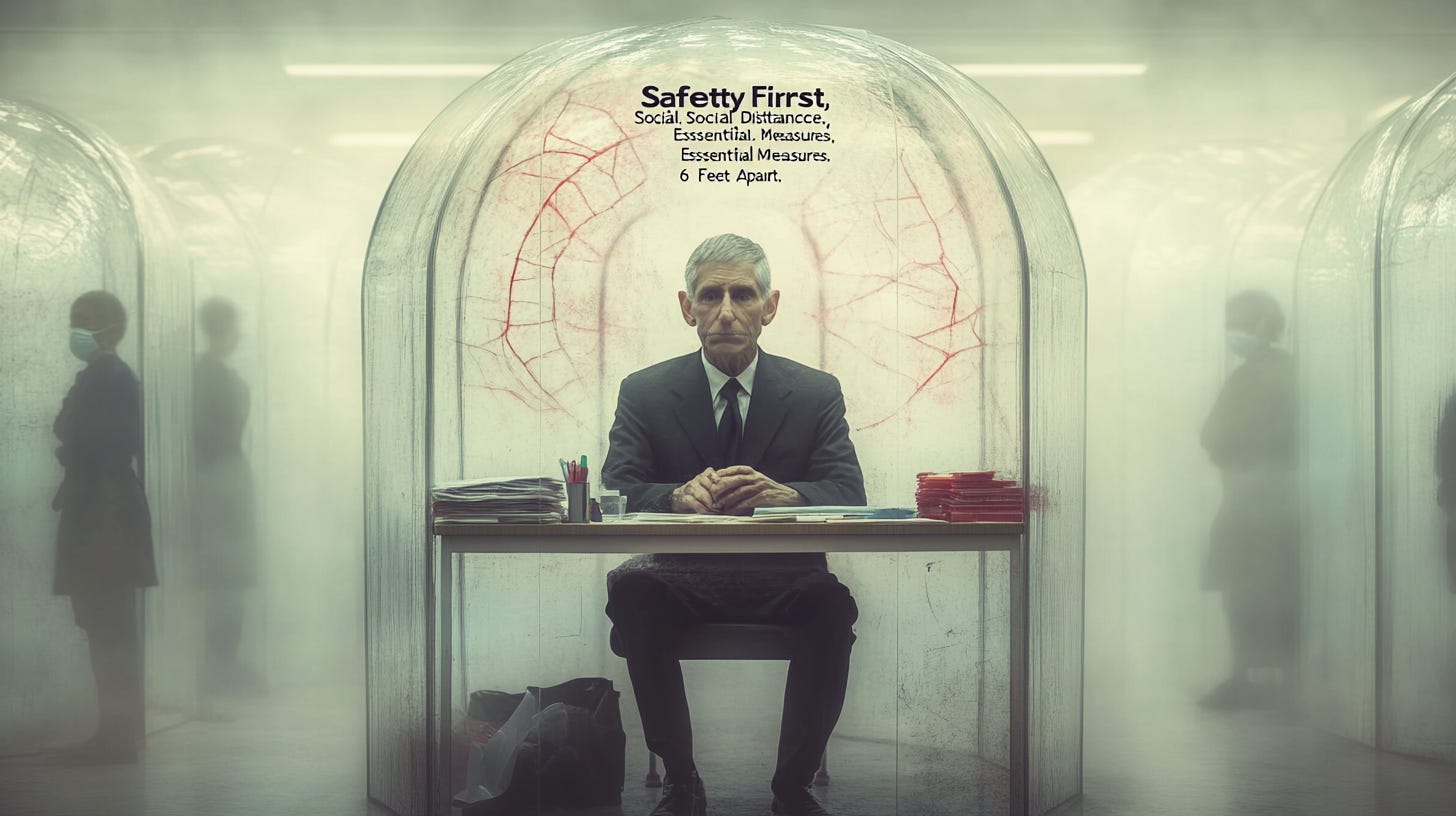
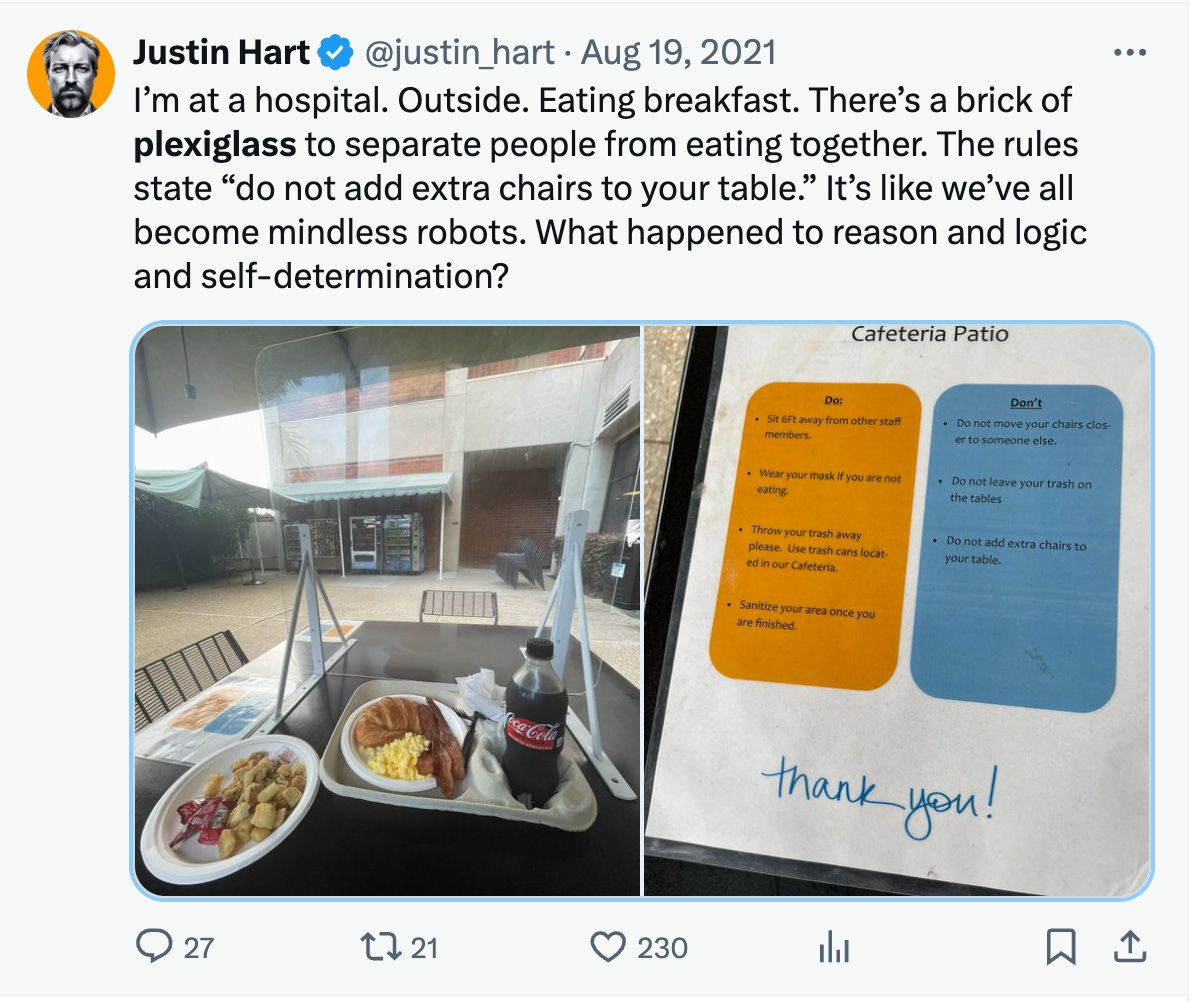
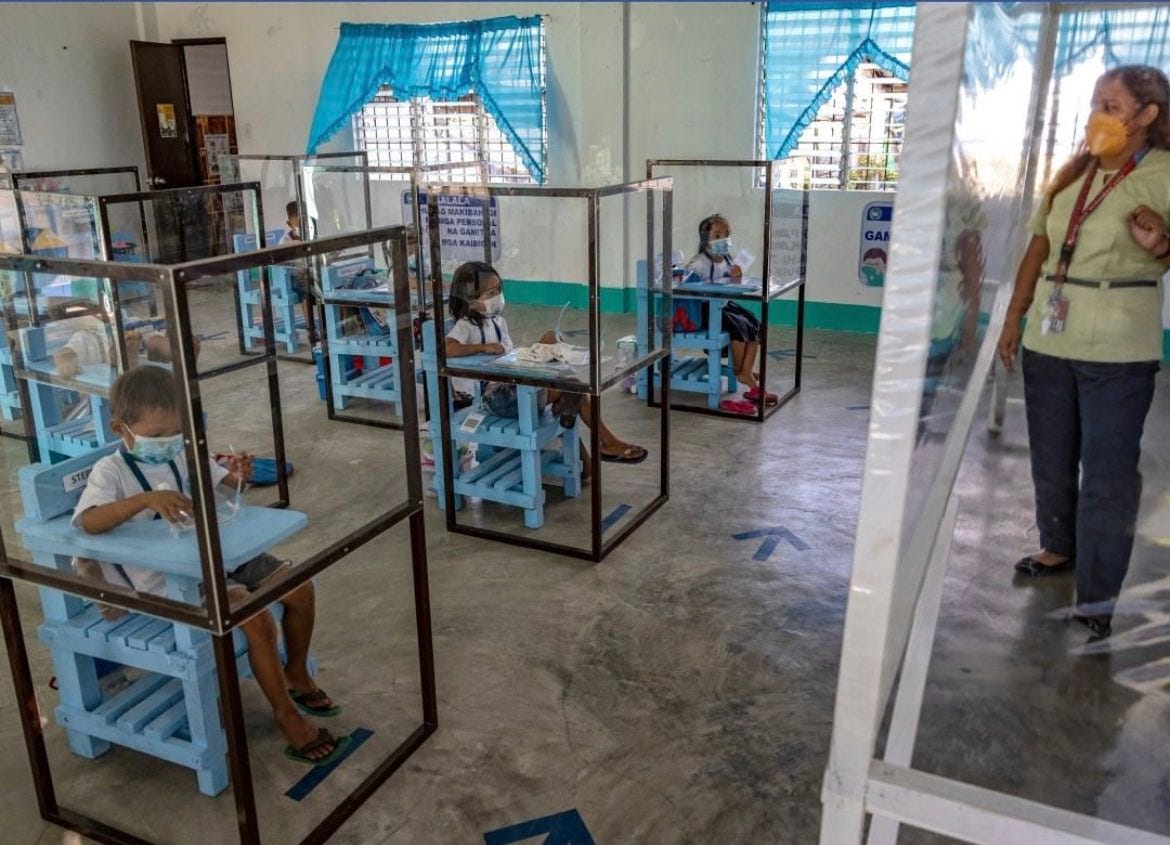
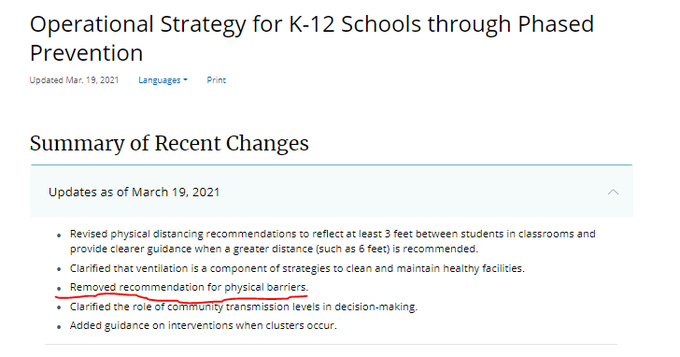
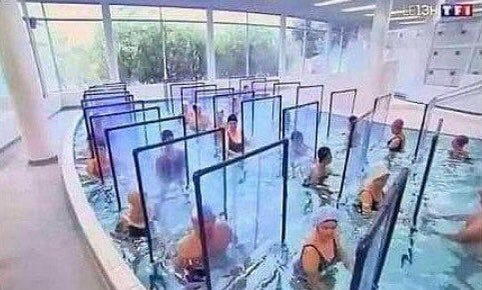
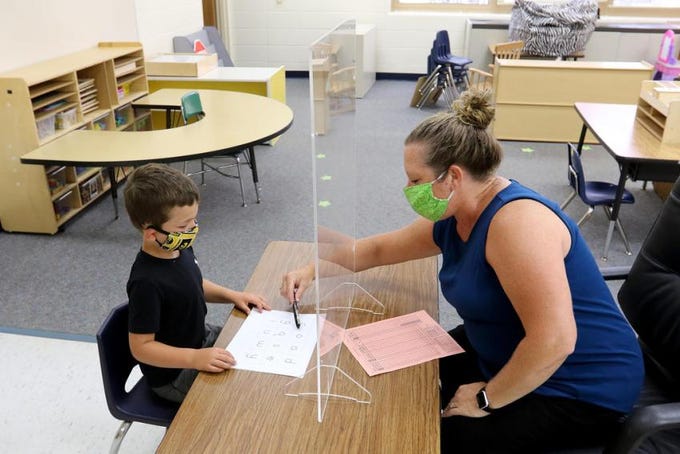
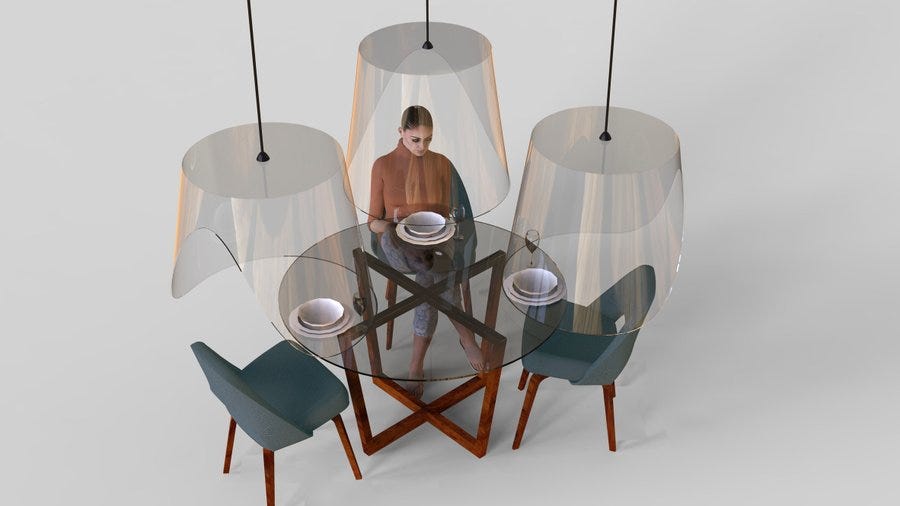
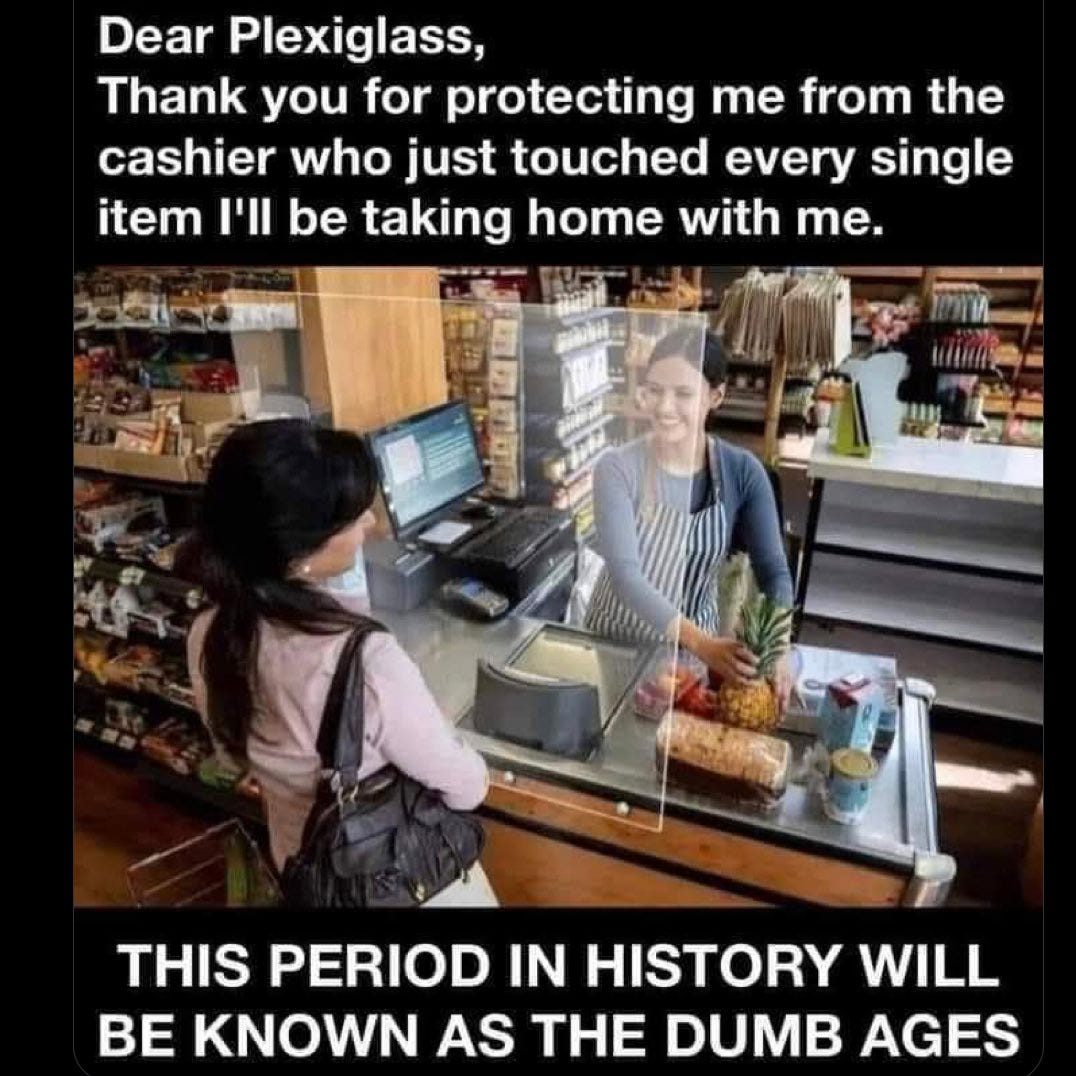
Our dearest Uncle Screwtape continues to enchant. Verily I say unto thee, the Plexiglas Chronicles will form an entire chapter in the Epoch of the Great Covid Dumpster Fire. And for good reason. I mean, aside from standing to put on your mask but sitting to take it off, what pageant of lunacy was more obviously ready for a Laurel and Hardy sketch?!?!
More Screwtape Covid Letters, I beseech you!
You've landed on a voice we haven't heard before. It's brilliant! There's no whining or implicit complaining, as is so often seen in parodies by the left. There's even a warmth and quasi-compassion, intermixed with a profound disdain for people. A triumph of artistic control! You've managed to convey profound insights about humanity in a quirky not-overly-intellectualized manner. What an accomplishment! Thank you.